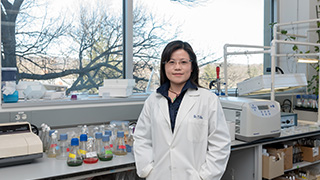The First Research Computing Project Using AWS LightSail for Research: A Seed for Bigger Dreams
Tuesday, March 19, 2024

Professor Tina Chu
In the fast-growing world of higher education technology, the role of research computing has become increasingly important. As universities strive to maintain their edge in academic excellence and innovation, the push towards advanced research computing is not just a trend, but a necessity. In an era where data-driven research is transforming disciplines from the humanities to the hard sciences, the ability to employ computational power is synonymous with the ability to lead in academic thought and discovery.
Moreover, research computing is essential in preparing the next generation of scholars and professionals. By integrating advanced computing resources into the curriculum, universities are equipping students and faculty with the skills and knowledge necessary to succeed in an increasingly data-driven research world. This educational aspect ensures that graduates are not just consumers of technology, but creators and innovators, capable of driving forward both academic and industry advancements.
As research becomes more data-intensive and reliant on advanced computing technologies, the collaboration between libraries and IT becomes even more crucial. University libraries have long been the custodians of knowledge, managing extensive collections of books, journals and digital resources. However, their role in the modern academic landscape extends far beyond these traditional functions. Libraries are evolving into dynamic centers for research support, offering expertise in scholarly communication, data management and curation. They play a critical role in managing the vast amount of data generated by research activities, ensuring that this data is accessible, understandable and reusable. By doing so, libraries contribute significantly to the research lifecycle, from the inception of ideas to the dissemination of findings.
Additionally, IT departments are the backbone of the technological infrastructure within universities. Their expertise in managing complex computer systems, networks and software is indispensable in today's research environment. Therefore, Seton Hall University Libraries, the Biology Department and the Department of Information Technology launched a collaborative innovation, using Amazon Web Services (AWS) LightSail for Research. Over 100 hours were invested in configuring the software by the IT Department, leading to the successful implementation of a groundbreaking system that automatically generates workspaces for students based on course enrollment. This initiative marks a significant milestone in expanding access to research computing, merging the rich academic knowledge of the library with the technical expertise of the IT sector, and the innovative vision of Tina Chu, Ph.D.. "By leveraging the University's cloud technology, research computing gains unprecedented flexibility and scalability," explains Paul Fisher, Seton Hall’s Chief Information Officer. "Researchers can access powerful computing resources without the need of expensive hardware, streamlining workflows and driving innovation."
Chu, a distinguished biology professor, is the first faculty member at Seton Hall University to utilize AWS LightSail for Research on campus. Her work and involvement represent the potential of this collaboration and highlights the importance of faculty engagement in utilizing new technologies for both research and teaching. This sets a precedent for future research projects.
“The introduction of AWS LightSail for Research signifies a pivotal step forward”, says Chu, “offering students and faculty researchers a new realm of possibilities, particularly in the fields of biology and multi-omics analysis. It streamlines data processing, including next-generation sequencing (NGS) analysis, facilitating impactful insights across various disciplines, such as molecular biology and personalized medicine.” Chu continues “this project highlights the collaborative efforts of everyone involved, including the DataLab from the University Libraries, the IT department, and our students, Vanessa Guo and Victor Carrillo. I am excited to be part of this dedicated team, which showcases the intersection of technology and research, fostering innovation in academia.”
Understanding AWS LightSail for Research
AWS LightSail for Research is an innovative cloud computing service provided by Amazon
Web Services. It simplifies the process of setting up and managing virtual private
servers in the cloud. LightSail offers a streamlined and user-friendly platform for
individuals and organizations to launch and maintain applications and websites on
the internet, without the complexities often associated with cloud computing. AWS
LightSail provides researchers with the flexibility and scalability needed for computational
research tasks, from data analysis to machine learning. This tool enables researchers
to focus more on their research and less on the technical challenges.
Empowering the Next Generation: Student Involvement

Senior Victor Carrillo
Central to this project's success is the involvement of two Seton Hall University students, Victor Carrillo, an undergraduate in computer science, and Vanessa Guo, a graduate student in biology. These students have been given an opportunity to work directly with AWS LightSail, gaining invaluable experience in the intersection of technology and research.
Victor Carrillo, with a background in computer science, reflects on the experience: "Working within the Data Lab and using LightSail has been fulfilling. I'm enthusiastic about my ongoing involvement in the project and aspire to bring significant insights and progress to Seton Hall. Our aim is to leverage Data Science to drive research advancements, especially at Seton Hall University, and support its academic growth."
Meanwhile, Vanessa Guo, a biology student, shares: "I am grateful to have been given this opportunity to analyze research data. As a biologist, I don't have much [of a] computer science background, but I was happy to collaborate with experts in the field. LightSail is very convenient and was easy to operate. Our aim is to turn raw next-generation sequencing data into interpretable results that are easy to understand."
For more information about how Seton Hall is using Amazon LightSail, contact:
Sharon Ince
Categories: Research, Science and Technology






